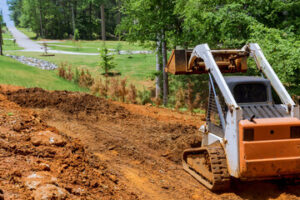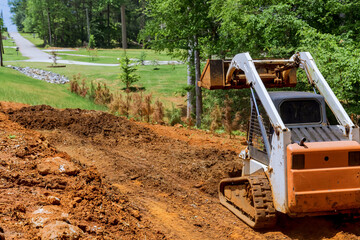Excavation Contractors play a pivotal role in commercial construction projects. Their work lays the foundations for all subsequent building activities. Using large motor equipment such as tractors and excavators, they clear the land of debris and other obstacles that could interfere with the project.
When choosing an excavation contractor, look for one that prioritizes safety, compliance, and transparency. Check online reviews and ask for a detailed quote that includes all costs. For professional help, contact Bar T Excavation, LLC.
Site preparation is the first step of every construction project and sets the stage for safety, compliance with regulations, quality, and efficiency. It involves clearing, digging, and grading land to prepare it for building activities. This is a complex task that requires advanced equipment and expertise, but it’s also an essential step to avoiding structural issues, keeping costs low, and ensuring the longevity of the finished product.
To begin, a team of experienced excavators clears the site. They remove any debris, vegetation, and obstacles, such as fences, to make the area safe for construction work. They also identify any potential environmental risks and implement measures to minimize their impact.
Then, they dig foundations, trenches, and utilities to precise engineering specifications. They may also install drains to manage water runoff and ensure proper drainage, which is crucial to minimizing erosion risk and maintaining soil stability.
Lastly, they coordinate with paving teams to lay roads and other surface infrastructure. This is a complicated process that requires careful excavation to create a stable base and integrate critical infrastructure, such as water, sewage, and electricity systems. It also requires trenching—digging narrow excavations to lay the lines under the ground—which is a delicate and time-consuming procedure that can have serious consequences if done improperly.
Excavating contractors use a wide range of equipment for site preparation. Some of the most common pieces of machinery include bulldozers and wheel loaders. These large vehicles are ideal for removing and moving debris, leveling the land, and shaping it to the desired contour. They can also be used for demolition and other heavy-duty tasks. Environmental excavation contractors often employ these machines to improve soil conditions by modifying fill types, improving compaction, and incorporating other materials to enhance a building’s durability. They also take care to avoid damaging existing utility lines. They are also trained to assess the load-bearing capacity of the land and its underground water levels. These factors determine whether the site is suitable for a new building or not. Ultimately, a skilled and experienced excavation contractor is indispensable to the success of any construction project.
Final Grading
When building a new home, there are a million and one decisions to make. Most of these are focused on the interior, with homeowners considering everything from floors to light fixtures to wall colors. However, there is a point in construction when it’s necessary to shift focus to the exterior of the property. This is when the final grading of the land takes place. This is a significant step that has far-reaching consequences for the long-term functionality and aesthetics of the home.
The final grading process is much more precise than the rough staking stage, and involves using heavy machinery to adjust the terrain according to the project’s specifications. This ensures that the ground slopes and contours are aligned with the intended design, contributing to the success of construction and ensuring the property is safe for future use. It also helps to meet regulatory standards and environmental regulations, preventing any problems from developing down the road.
When choosing a contractor to perform final grading, it’s important to select someone with extensive experience in the industry. This is because there are a number of factors that go into the work, including weather conditions and the availability of equipment. The best excavation contractors have a deep understanding of what is required to complete the task quickly and efficiently, saving builders time and money while delivering exceptional results.
For example, the time of year is critical, as digging during the winter can be dangerous. This is especially true in upstate New York, where the climate is colder and digging requires specialized equipment to break through frozen earth. To avoid costly delays, contractors should have access to a fleet of well-maintained machines that can handle a variety of terrains and projects.
In addition, an experienced excavation contractor will be able to anticipate potential issues and take steps to mitigate them, keeping construction on schedule and under budget. Ultimately, hiring an excavating contractor that has experience working on commercial projects is the best way to guarantee a seamless construction process. This will minimize the risk of hidden hazards that can lead to expensive and hazardous problems down the road.
Integrating Vital Infrastructure
Every towering building, cozy home, and bustling commercial center starts with expert excavation. Whether the project is a new parking lot, swimming pool, or waterway, this crucial first step makes or breaks the rest of construction’s timeline and budget.
Skilled excavation contractors can do much more than dig a foundation trench, however. They also ensure that vital infrastructure like sewer systems, electrical conduits, and gas lines are properly integrated into the excavation site. Without precise excavation, these systems might be installed at the wrong points on the construction site, leading to operational issues and expensive repairs down the line. With a skilled contractor, these problems are prevented by carefully planning the entire site layout in advance of digging and by incorporating proper backfilling and compaction once the utilities have been installed.
While some excavating contractors specialize in particular fields, most provide a full range of services for residential and commercial property owners. Besides digging, they can also do milling and paving to increase the functionality and value of your property. Using the right paving materials and ensuring that the ground surface is level and ready for new pavement can increase the life of your driveway or parking lot while improving its curb appeal.
Those who work in the excavation industry often encounter unique environmental challenges that require specialized skills and expertise. For example, old industrial and commercial sites may have contaminated soil. Identifying and managing these contaminants is crucial for maintaining the integrity of the surrounding environment and meeting regulatory requirements. This often involves specialized techniques such as soil washing or encapsulation.
While the importance of excavation contractors goes unnoticed by many, these unsung heroes are essential to turning construction plans into reality. By providing the foundation for future projects, they save their clients time, money, and stress. By choosing an experienced, reputable contractor to handle your excavation work, you can rest assured that the project will be completed on schedule and within budget.
Equipment Maintenance
Every towering commercial building, cozy home, or pristine landscape starts with expert excavation work. Yet not all excavation contractors are created equal. An inexperienced contractor can miss critical factors affecting project stability, water drainage, and foundation strength—causing expensive setbacks down the road.
Construction equipment, like construction excavators and snow plows, require regular maintenance to perform reliably. These machines are subjected to harsh conditions, ranging from sun and rain to snow and mud. A proactive approach to maintenance can significantly reduce breakdown rates and extend equipment lifespans.
Maintenance services for construction equipment include a variety of tasks, including inspecting hydraulic systems and checking fuel levels and engine oil. In addition, telematics and monitoring systems can provide real-time performance data to help identify issues before they become costly problems.
For example, a warning light turning on, a loss of power in the machine, or unusual noises could signal low hydraulic fluid or a leak. In these cases, a professional inspection can help determine the source of the problem and implement corrective measures before it becomes worse.
Other maintenance services include repairing and replacing damaged equipment parts, cleaning and flushing hydraulic fluid, and checking electrical systems. Performing these routine checks and services helps keep equipment running as it should, maximizing project efficiency.
Besides maintaining equipment, an excavating contractor can also clear land and debris to prep it for construction projects. This service can be essential for a property owner looking to sell their land or reduce fire hazard risks. Additionally, clearing and grading can prepare the site for asphalt and other types of paving, increasing the utility of a property.
Whether it’s a commercial or residential property, proper landscaping can increase curb appeal, enhance value, and add utility. A professional excavation contractor can assist with this process by clearing land, removing old structures, and leveling and grading the soil. In addition, a professional excavation contractor can also install and repair drainage systems to prevent flooding or erosion. This is important because water runoff can damage infrastructure, and it’s critical to minimize environmental impact. Choosing a reputable excavation company to handle your landscaping needs can save you time and money while guaranteeing high-quality results.



